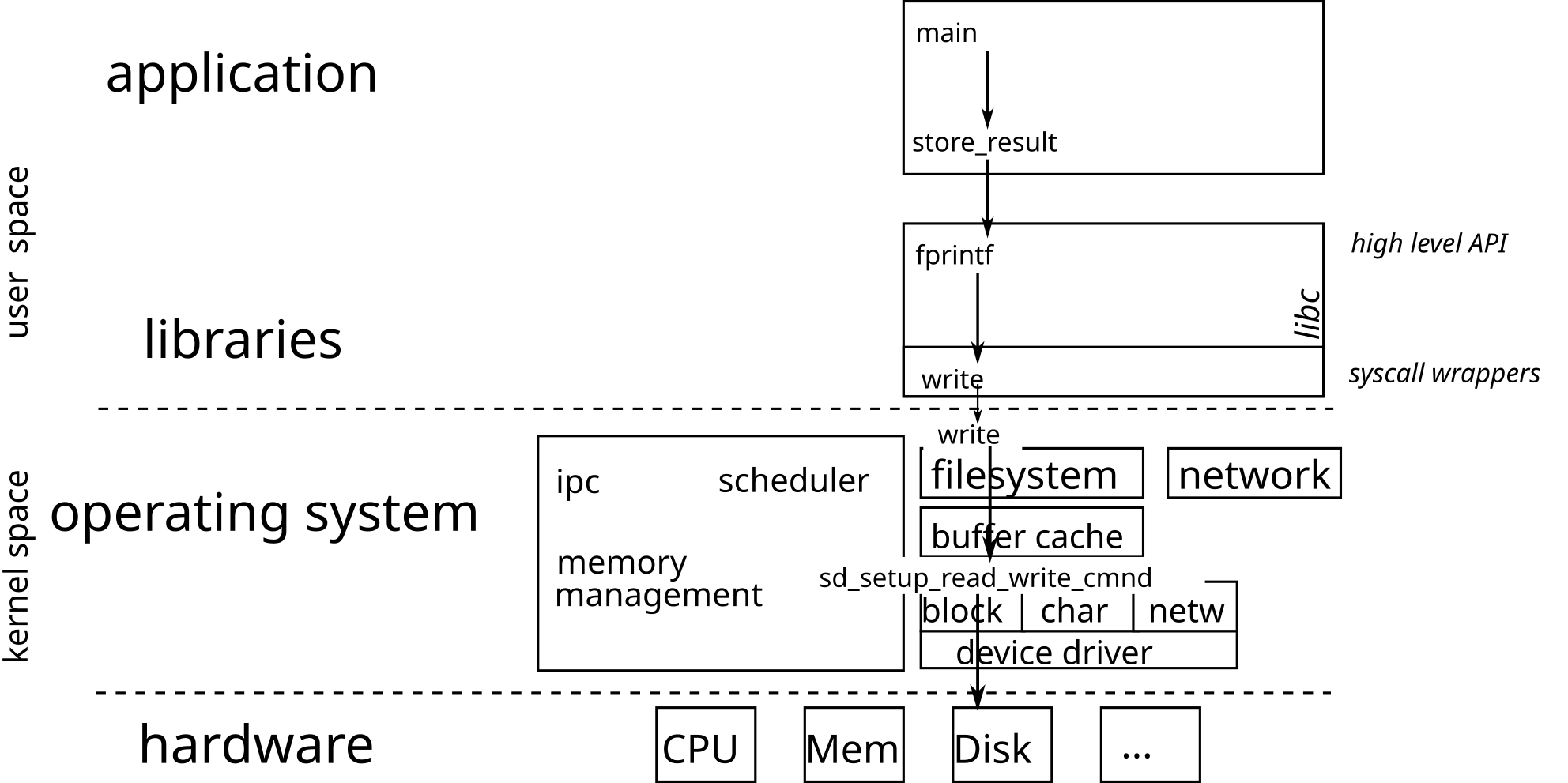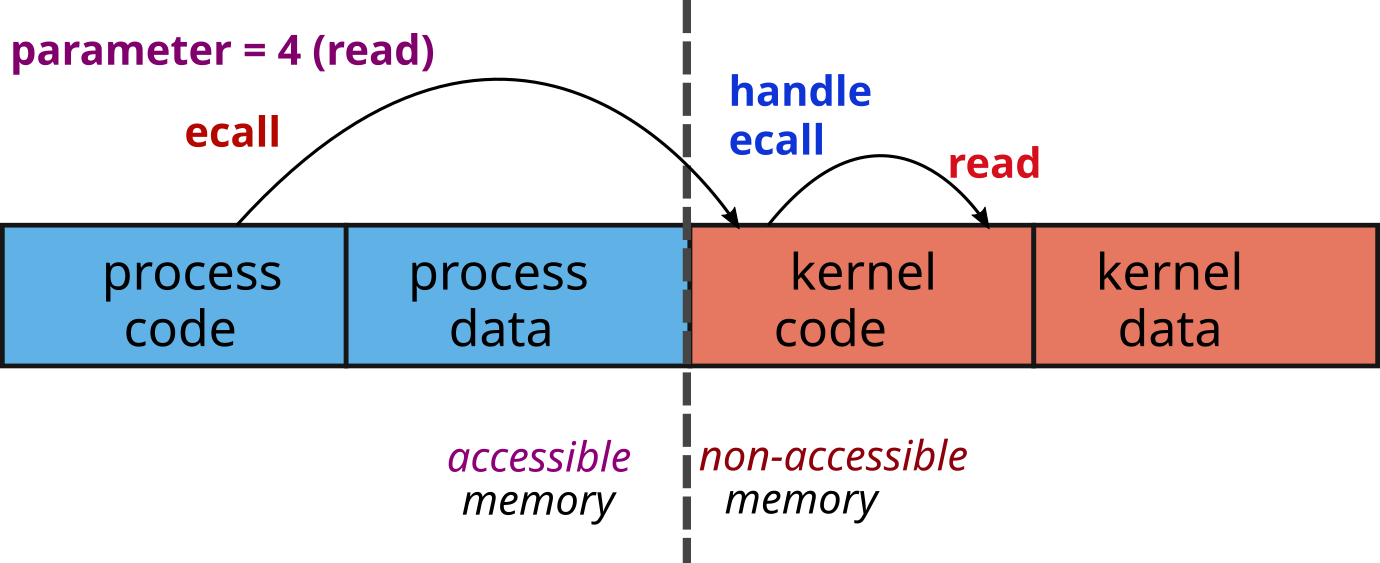System calls
Gaël Thomas
Mathieu Bacou
Operating systems
- Features
- Offers a unified programming interface to the developer
- Hides hardware implementation details
- Allows you to run multiple processes on a processor
- Composition
- A library called kernel
(noyau in French)
- Unified programming interface (open, fork, etc.)
- Defined by specifications (System V, POSIX, Win32…)
- A set of programs allowing to interact with the
core
ls,cp,X,gnome, etc.
- A library called kernel
(noyau in French)
Operating systems (2/2)

Testing the return value of system calls and functions
You must always test the return value of a system call and deal with errors
Prevent the propagation of errors (the discovery of the error can take place much later)
see the fail-fast approach presented in CSC4102
errno: external variable indicating the cause of the last errorThe
ERRORSsection in a function manual describes the possible causes of error.
Stack frames
- Each function call creates an stack frame
- A stack frame contains
- local variables
- a backup of the modified registers
- the arguments of the function, if there are too many to fit in the registers
- the return address of the function
Content of a stack frame
- A stack frame is defined by
- the address of the top of the stack (the
spregister) - a base address that indicates where the frame begins
- on x86, it is kept in the
rbpregister - on RISC-V, the compiler keeps track of it when generating assembly
- on x86, it is kept in the
- the address of the top of the stack (the
- Function entry:
- decrement
spto make space to save registers, and for local variables - save registers
- save
ra
- decrement
- Function exit:
- restore saved registers
- restore
ra - increment
spback to its previous value - jump back to
ra
Buffer overflow
- (in French dépassement de tampon)
- Writing data outside the space allocated for a buffer
- Risk of overwriting other data
- Security vulnerability: overwriting data may change the behavior of the application
Stack overflow
- Using a buffer overflow to change the program execution flow
- The return address of a function is on the stack -> possibility of choosing the code to be executed afterwards
How to prevent buffer / stack overflow?
- Check the boundaries of buffers
- done automatically in Java
- not done in C / C ++ because it is too expensive
- Do not use the unsafe functions (
strcpy,gets…)- Use their safe counterpart instead (
strncpy,fgets…)
- Use their safe counterpart instead (
- Non-executable stack (enabled by default by Linux)
- avoid the execution of an arbitrary code
- Stack canaries
- A canary (a specific value) is placed on the stack when entering a function
- If when exiting the function, the canary has been modified, there has been a stack overflow
- Use the
-fstack-protector-alloption in gcc
- Address space layout randomization (ASLR) (enabled by
default by Linux)
- load the application code to a random address
User/system interface
- The kernel must protect itself from processes
- To avoid bugs
- To avoid attacks
- For this, the processor offers two operating modes
- The system mode: access to all the memory and to all the processor instructions
- The user mode: access only to the process
memory and to a restricted set of instructions
- In particular, no direct access to peripherals and instructions that manage the permissions associated with the memory
User/system interface
- Problem: how do you call a kernel function when you can’t access its memory?

User/system interface
- Solution: special processor instruction to call into system mode
- The kernel associates the address of a
syscallfunction to handleecall - To call a kernel function
- The process gives the function number to call via a parameter
- The process executes the
ecallinstruction - The processor changes mode and executes the
ecallhandler - the handler uses the parameter to select the kernel function to be executed
- The kernel associates the address of a

Bibliography
[riasanovsky] Riasanovsky, Nick. “Understanding RISC-V calling convention.” EECS Department, University of California, Berkeley, Tech. Rep.[Online]. Available: https://inst.eecs.berkeley.edu/~cs61c/resources/RISCV_Calling_Convention.pdf
[aleph1996] Aleph, One. “Smashing the stack for fun and profit” Phrack #49, 1996. [Online]. Available: https://phrack.org/issues/49/1